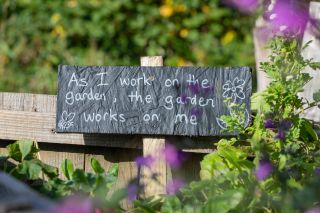Body Image
The Relationship Between Nature and Body Image
Why feeling connected to nature can promote positive body image.
Posted July 3, 2023 Reviewed by Devon Frye
Key points
- Developing a connection to nature may be a "turning point" from negative to positive body image.
- Connection to nature is related to a more positive body image and well-being.
- Connection to nature shifts our focus from appearance to functionality.
- Connection to nature encourages us to see our body as part of something "bigger."

This afternoon, I finished an online meeting with my colleagues and, closing the Zoom screen, realized that I was feeling anxious. I had been staring at the screen almost non-stop for the whole day, and was tempted to continue with the next item on my “to-do” list when it occurred to me that I should probably take a break.
So I went downstairs and wandered into the garden. I don’t know where the idea came from, but I decided to set 10 minutes on our kitchen timer to do some gardening. I grabbed the garden shears from our shed, a bucket, and my gardening gloves, and started to clip off some weeds that had been bothering me for weeks.
By the end of the 10 minutes, I had a full bucket of weeds, one bug bite, an empty mind, and a feeling of satisfaction that my garden looked a little tamer than before (save for my children’s sand toys and sidewalk chalk strewn about). I felt calmer and, as the timer beeped, ready to go back to my desk.
As I climbed the stairs, I began to think about how that simple act of gardening for 10 minutes had been so helpful for my body and mind. Sitting back at my desk, I couldn’t help but think about some of the participants from my recent study about body image.
Specifically, in this study, me and my colleagues were interested in how women who used to experience a negative body image in the past had journeyed toward experiencing a predominantly positive body image over time. We wanted to know: What experiences or factors helped them to develop a more positive body image? What do they think “sparked” these changes for them?
Interestingly, several women in this study described that spending time in nature, and developing a positive connection to nature, had been a key turning point in their journey toward loving and respecting their body.
For one woman, this looked like going for hikes through the forest and mountains near her home, and taking the canoe out with her friends; for another woman, this was about appreciating a beautiful flower or tree on her walk to work. Another woman described being mindful of nature when she was choosing food at the grocery store, and cooking her meals at home. Through these reflections on the beauty and importance of nature, the women described that they felt more positively about their own body, too.
When I asked them to describe more about this connection between nature and their body image, one woman reflected that nature “checks all the boxes,” such as engaging in joyful movement, spending time away from the stressors of daily life (e.g., Instagram), and enjoying time with her friends and appreciating how her body enables that (e.g., my arms enable me to canoe with my friends). Another woman described that when she is able to appreciate the beauty of a flower or tree, exactly as it is, she realizes that she should apply the same compassionate perspective toward herself because she, too, is part of nature. Relatedly, many of the women who experienced a positive connection to nature, described that it helped them to see their body as part of something “bigger,” which also put any concerns about their physical appearance into perspective.
These women’s experiences and reflections are in line with many other studies and theories within the body image field. For example, my own research line has shown that appreciating all of the things our body is able to do (e.g., smell a flower, touch a tree, walk with a friend) is an especially effective technique for improving positive body image (e.g., Alleva & Tylka, 2021). Key theories in the field such as objectification theory (Fredrickson & Roberts, 1997) and the developmental theory of embodiment (Piran, 2017) support that experiences that help us to shift our focus away from our physical appearance, toward other aspects of our body (e.g., functionality) and self, will help to foster positive body image and counteract societal pressures to overvalue physical appearance.
Professor Viren Swami from Anglia Ruskin University in the UK has also been developing a research line that focuses on nature connection and body image, too (e.g., Swami et al., 2022). Overall, his research supports the relationship between spending time in nature, nature connection, and a more positive body image. He too proposes that connectedness to nature should shift our attention away from physical appearance and toward a more holistic sense of embodiment, as well as promote a view of the self as part of a broader ecological system in need of care.
Our study showed, for the first time, that connection to nature may not only be related to a more positive body image. It could also be an important “turning point” in the journey from a negative body image toward a more positive one.
The growing evidence for the link between nature connection and positive body image is exciting because it reveals another pathway through which people can experience a more positive body image. Added to that, of course, is the fact that nature connection is also related to other facets of well-being more broadly—such as I experienced today, when just 10 minutes in my small garden restored a sense of calm in my busy day.
While more research—especially more experimental and longitudinal research—is needed to strengthen the case for nature exposure and positive body image, it is certainly worth a try. The next time you are feeling down (in general or about your body), try spending some time connecting with nature in a way that is possible or feels “right” to you, whether that be sitting in your garden and watching the birds, stopping to smell a rose bush on your trek to work, or going for a walk through the park with your dog. I hope that it helps!




